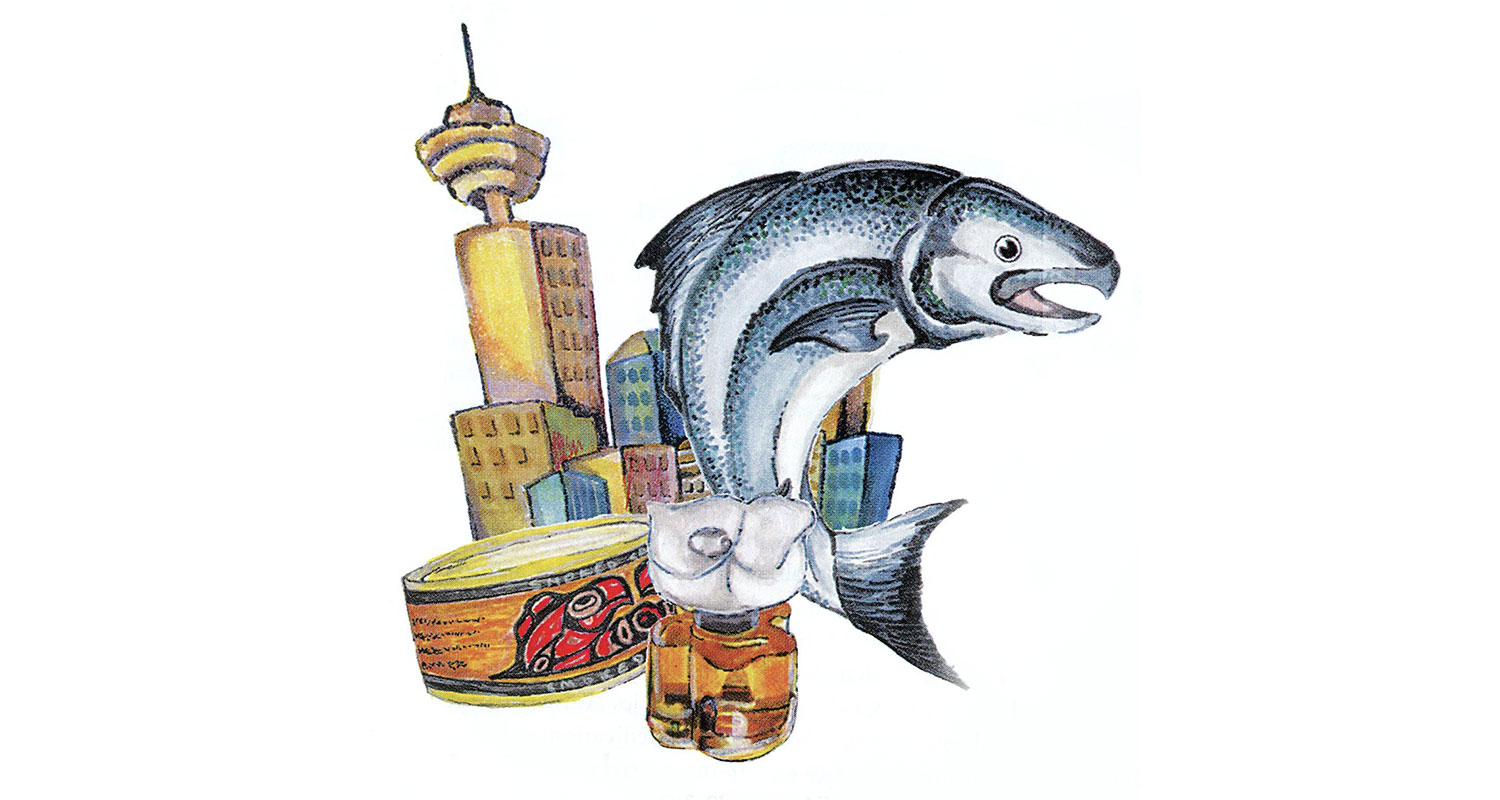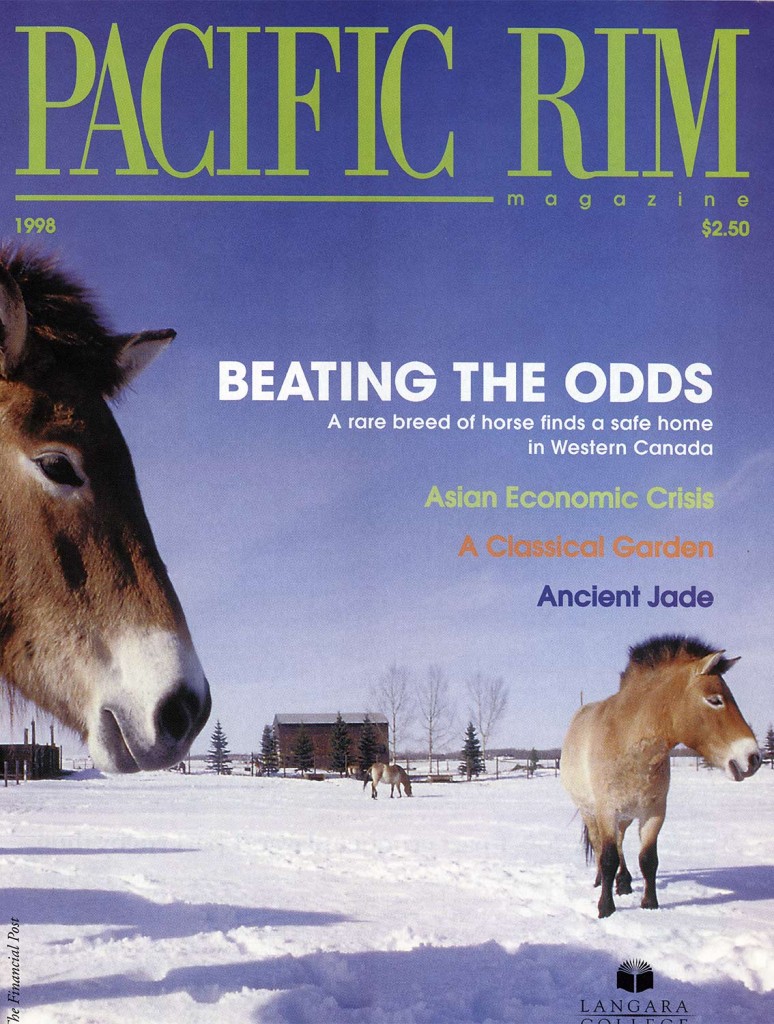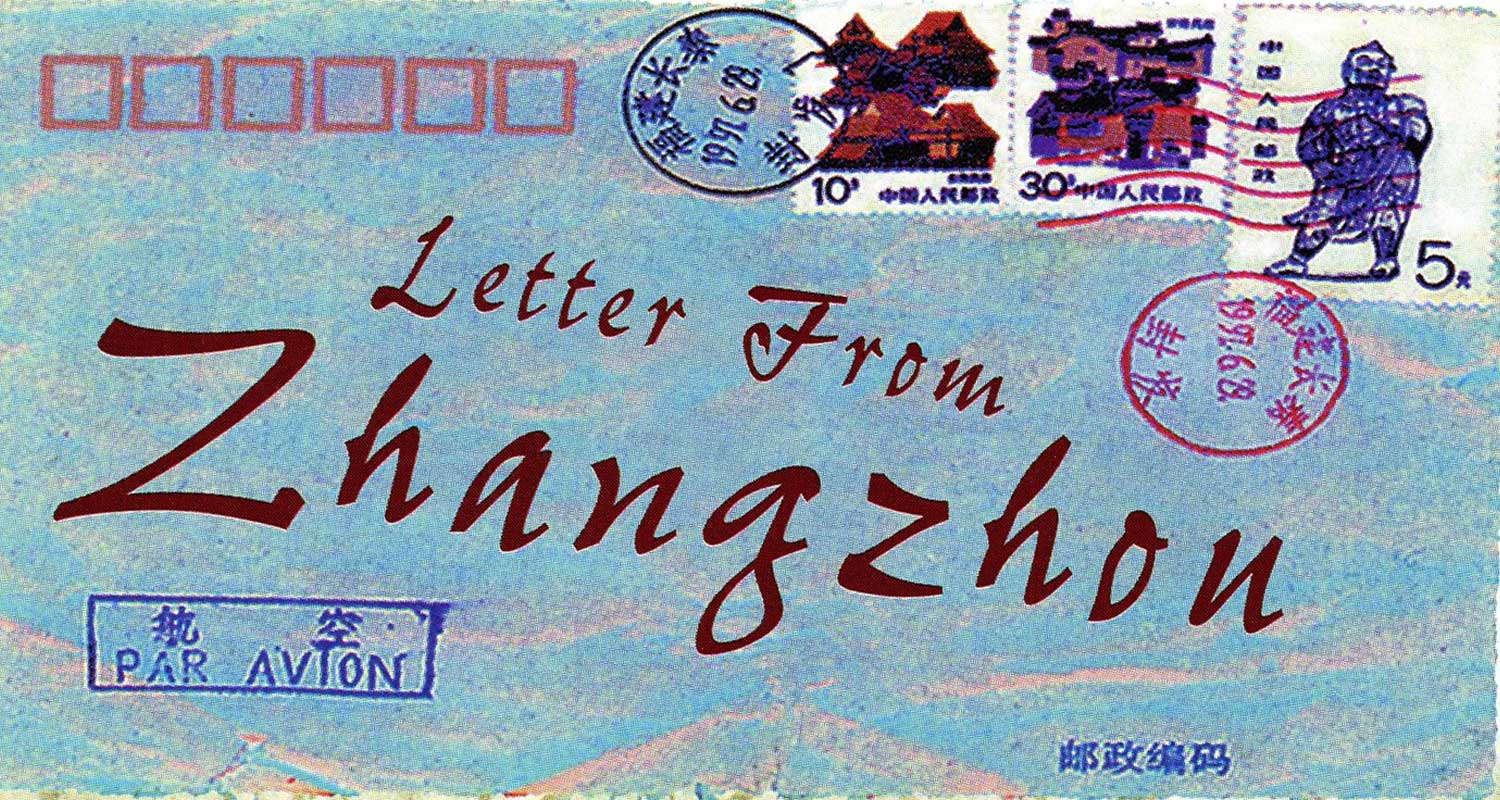Jay Kim, the manager of the OK Gift Shop on Alberni Street, is keeping things in perspective. “It will be worse, no doubt about it,” he says. “But I don’t think it will shake things up like the Kobe earthquake.” He sits in his small office on the second floor of the store he has managed since 1991. His store is one of the half dozen along Alberni Street, just off Georgia Street, that cater much of their business to Asian tourists.
Kim believes the Asian crisis has yet to have a significant impact on his store, where almost all of his customers are Japanese. The OK Gift Shop offers a range of items. In one corner, Canadian-made wool sweaters, sweatshirts and T-shirts are on display, in another, jewellery, silk scarves, and fox and mink collars are for sale. Decorative bottles of maple syrup, packages of maple leaf cookies, chocolate and salmon jerky also stock the shelves. The store also sells key chains, pins and other souvenirs.
Kim says the food items are the most popular, since they sell for under $20. It is the high-end merchandise, such as the furs, designer handbags and perfume, that isn’t going anywhere. “Expensive items are very hard to sell these days,” he says.
A Decline In Tourists
In 1997, he estimates that overall sales dropped 15 to 20 per cent. Since 1995, which was an outstanding year for his business, sales have decreased 35 per cent. “That’s a tremendous decline.”
The busy season is usually between May and mid-October, when airfares are cheapest. Kim has noticed a visible decrease in the number of Japanese tourists coming into his store and on top of that, he says they’re just not spending as much as they used to.
Next door, Allders International Canada, one of the largest duty free retailers in Canada, is also preparing for a difficult tourist season. “If we have a very good summer, we will probably just break even,” says Li Lin Hsu, store manager. “The decline of passengers, the decline of [customer] buying power-that is really affecting business.”
Hsu says that approximately 70 per cent of her customers are Japanese, 20 per cent are Chinese and Taiwanese and less than 10 per cent are Korean. The Japanese, her most important customers, are not buying as many brand names as they used to. “Before, the Japanese were buying bulk and now they only like to buy souvenirs, the small, light items and anything that is a good deal.”
Hsu estimates that sales have dropped 30 per cent overall from last year. Along with a decline in Japanese tourists, there has been a recent decrease in Korean shoppers. “In the last three months or so we have seen a decline in Korean customers,” she says. “But until recently, we haven’t seen any Korean tourists at all. Because the Korean government is encouraging their people to spend money inside Korea-they don’t want them to spend money outside their country.”
How Are The Stores Preparing For The Decline in Sales?
To prepare for a slow summer, Hsu says Allders will not increase their hours of operation as they normally would. Winter hours of 9 a.m. to 7 p.m. will be kept for now, and if business picks up, the store will remain open until 11 p.m.
Asian Tourists Aren’t Coming To Vancouver
Both Kim and Hsu agree that the next few months will determine the impact that the Asian economic crisis will have on business. But if numbers are any indication, it’s clear that Asian tourists are not only spending fewer dollars, they’re simply not coming to Vancouver as much as they have in the past. According to the Vancouver International Airport Authority, Asian Pacific traffic, which represents 66 per cent of international travel, grew at a rate of 16.9 per cent in the first half of 1997, but growth fell off during the second six-month period to 5.8 per cent. Tour companies have also noticed a decline in the number of passengers coming to Vancouver. Japanese tourists make up 60 per cent of the business of TransPacific Tours Canada Ltd. Lately, the company has noticed a 12 to 15 per cent decline in the number of Japanese tourists booking tours to Vancouver.
Daniel Lau of Wingo Travel Canada says there has been a 20 per cent decrease in the number of travellers coming from Taiwan and a 30 per cent decrease in passengers coming from Hong Kong. Because there has also been a large drop off in Korean and Japanese tourists, Wingo’s company has lowered fares and adopted a more aggressive marketing strategy.
Fewer Vancouverites are heading to Asia as well. In March, Asian airlines serving Vancouver, such as Cathay Pacific Airways, Malaysia Airlines and Singapore Airlines, offered discounts of at least 25 per cent due to a sharp decline in load factors. Malaysia Airlines reported load factors of only 50 to 60 per cent out of Vancouver to Malaysia.
Predictions for the tourist season as a whole are not looking rosy, either. In February, the Conference Board of Canada reported that B.C.’s $8.3-billion tourism industry would suffer a downturn this year because Asian countries are struggling with recession and the province’s economic growth is behind the rest of the country.
According to Tourism Vancouver, which represents 1,200 B.C.-based tourism businesses, 28 per cent of tourism revenue in the province in 1996 was spent by British Columbians. Other Canadians, accounted for 31 per cent of the total and spent $2.6 billion; American visitors made up 22 per cent of the total and spent $1.8 billion; 11 per cent of visitors were from the Pacific Rim and they spent $916 million; Europeans accounted for the final eight per cent of revenue and spent $628 million.
The Recession In Asia
The Conference Board of Canada advises that currency devaluation across Asia and the recession in Japan, Canada’s biggest overseas tourism market, will result in a downturn in tourism.
David Bond, vice president and Chief Economist of the Hongkong Bank of Canada, says he believes the downturn will continue into the year. “I think those economies are going to be in trouble for awhile,” he says. “And I think it’s going to take from three to five years in the short term to get out. Some of them are going to take longer but the major ones should be coming around in two or three years.”
Bond also says that while it is difficult to measure which sector has been hardest hit, the Asian economic crisis will be felt across the country. “It’s fairly hard to quantify because its impact is going to be pervasive across the entire country. We export a substantial number of our products, coal, lumber and so on, and the demand for those products is falling off. So to say it’s falling more in forestry than minerals, is it falling more in finished forest products than in pulp and paper, it’s pretty difficult to say. It’s hitting the resource sector pretty hard.”
Canadian Export Is Down
According to statistics released in February by the Conference Board of Canada, B.C. will be the province that is hardest hit by the Asian crisis. The province accounts for about 40 per cent of Canadian exports to Asia. Japan is the key export market for Canada in Asia, accounting for 47 per cent of exports, followed by China at 13 per cent, Korea at 12 per cent and Taiwan at six per cent.
In January, economists reported that exports to Japan led by coal, pulp and fish products, were off four per cent. They also predicted that the weakening performance of the Japanese housing market would pull down coastal lumber exports for the rest of the year.
Dr. Roslyn Kunin, a prominent B.C. economist, says that the tourism industry and the resource sector will continue to slump until the Asian countries begin to recover. She says Asian countries will not be able to revive their economies easily because there will have to be some major economic and social changes to their societies. “It is very deeply ingrained. What has been happening in Asia and the source of a lot of the problems, is that a lot of business decisions were made for non-business reasons. Basically, banks lent money, businesses did deals because of ‘cronyism,’ which is the nicest word I can think of. And so an awful lot of deals were undertaken because you wanted to do business with the right people.”
The Vancouver Hotel Association Planned Ahead
For large hotels such as Hotel Vancouver and the Hyatt Regency Hotel, the key to surviving this difficult period is having a diverse client base. Ian Powell, general manager of Hotel Vancouver and chair of the Vancouver Hotel Association, says he first noticed the decline in business last summer. “We’ve seen some fall off in the Asian tour business and that was to be expected-it wasn’t like, oh my god, when we woke up one day-we could see the writing on the wall from as far back as last summer. We modified our blocks accordingly as perhaps we wouldn’t have done before.”
Powell says large hotels can cope with the downturn in the Asian market because they don’t rely solely on Asian countries for their business. “People say, ‘you do a lot of Japanese business,’ well, yes, we do, but when you put it into relative percentages, you’re not looking at huge amounts.” Powell says only six per cent of their guests last year were Japanese tourists, so the downturn is not “going to kill business.” He adds that diversification is the key when one market is on the decline. “When you’re dealing with big markets, if Asia is off, maybe there’s more in Europe to be taken or the emerging market in South America, which means you have to change gear very quickly and hopefully you have strategical partnerships sorted out. You can’t all of a sudden start creating them, so it really is a test of your depth and how much prep work you’ve done.”
Mark Andrew, general manager of the Hyatt Regency Hotel, says it is still too early to tell what effect the crisis will have and expects the results to be more noticeable during their peak season, which is mid-May to mid-October. But, he says, because the Hyatt has a diversified market, the Asian crisis will not likely have much of an effect on business. About 25 per cent of the guests at the Hyatt are from all over Asia, including Japan, Korea and Taiwan.
Canadian Dollar Encouraging More North American Travel
Andrew says the value of the Canadian dollar is encouraging more Canadians to vacation in Canada and the Hyatt is hoping to capitalize on that. The Canadian dollar is also drawing more American tourists to Vancouver and he also hopes to cultivate that market.
Optimism And Patience
Andrew is also optimistic that the downturn in the Asian market is temporary. “It’s important with the decrease in the Asian market not to turn our backs on it. It’s a market that needs continual work and they’ll come back. Every market goes through a cycle. This is not the end of business we’ll be seeing from Asia. If we thought that was the case, Vancouver would be in serious trouble. I believe it’s just a glitch, much like Europe had a little while ago where they were trying to get the European economy going to the strength it is now. We have many guests from around the world and having said that, we’re very lucky to have the business we’ve got. And we are certainly looking forward to helping it grow from Europe and South America, as well as from Asia when it does rebound, so that we’re there to catch it.”
While major hotels can look to diversifying their market, large retailers like Allders offer greater discounts and put emphasis on better service. “We’ve hired an outside company who will be retraining our staff to provide better service for our customers in April,” Hsu says. “Before, our staff didn’t have to worry much about sales since the customers were buying so much and the sales took care of themselves. But now, we need to provide better service so that our sales will improve.”
At the OK Gift Shop, Kim says he’s very pleased with his sales people and has no plans to retrain them. “I don’t think any other store has better salespeople than we do,” he says with a smile.
Kim says he believes that the upcoming year will be a difficult one, but says they will make it through. “For the next two years, we’ll just have to be patient.”











